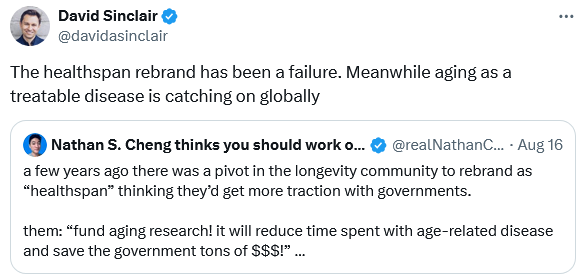That is a fair point to make. I had assumed something like this. It remains, of course, that the science was not good enough to make a profit in the medium to long term.
1 Like
Experimental drugs fail most of the time. Sometimes spectacularly. Lots of money is lost to failures in drug development. If everyone stopped at their first failure, science would truly be lost in a dark age.
Success is oftentimes built on the backs of failures.
3 Likes
KJasPG
#23
Despite whatever, Sinclair can make some fair points. Like, for example, treating aging as disease (in interviews).
Sinclair’s point: aging is characterized by almost all symptoms of pathology, yet it is not classified as a disease due to a merely observational (not experimentally established) criterion that if a condition is characteristic to more than half a population than it is sort of normal (~natural). While the goal of true medicine is to eliminate the root cause of any pathology and it does not achieve its main goal by treating aging as “natural”.
What is spectacular amongst the majority of medical and non-medical people is the disposition that if something is “natural”, than we sort of shouldn’t mess with it and religiously comply to some obscure “nature’s wisdom”. While naming something as “natural” frequently implies that:
- you just don’t have enough knowledge about it;
- as follows from 1), you can’t manage it.
Here a lab improved the Yamanaka proteins with AI to increase the number of reprogrammed cells.
Joe Betts-Lacroix | AI-assisted Protein Design for Cell Reprogramming
(maybe someone can get the white paper or at least list the compound formulations they came up with the AI)
3 Likes
The main effect.of classifying aging as a disease would be increasing the regulatory costs of any interventions to mitigate it.
1 Like
KJasPG
#25
If population stays productive for +20 years = more experienced workforce stays in the market = more taxes payed etc less cost of managing symptoms. Seems like it should override the regulatory costs of interventions.
2 Likes
The regulatory costs are paid by companies researching interventions.
That’s a bit pessimistic. Surely the recognition of aging as a disease would also have a lot more funding and resources allocated to the problem.
2 Likes
Private funding is linked to the potential ROI. Increasing regulatory costs reduces the ROI.
Government funding is a different issue, but does not require a regulatory shift.
1 Like
I don’t trust any current government administration, anywhere in the world that I know of, to make bold or truly effective moves in this space. Still, I share Aubrey’s hope that once we see RMR or another major breakthrough in extending lifespan in mice or higher organisms, it will trigger a profound shift in how governments, private industry, and humanity as a whole approach aging.
My hope is that people come to see these breakthroughs as something they are entitled to, so that small groups cannot monopolize or distort them for their own gain.
1 Like
A_User
#31

https://x.com/davidasinclair/status/1957187725309989036#m
Thoughts on this? Check “healthspan” vs “longevity” on google trends btw.
I think they are wrong, but am not inclined to spend material time arguing this. The two issues are linked. The argument for healthspan is easier to make. Few people support specific age related diseases.
2 Likes
Bicep
#33
I don’t know anything about rebranding, but common sense says making people live longer past 65 is going to cost the government more money. If healthier then maybe the SS could be reduced and people could work longer, but not everybody. Not likely the law on this will change much.
Age related disease will hit everybody for sure.